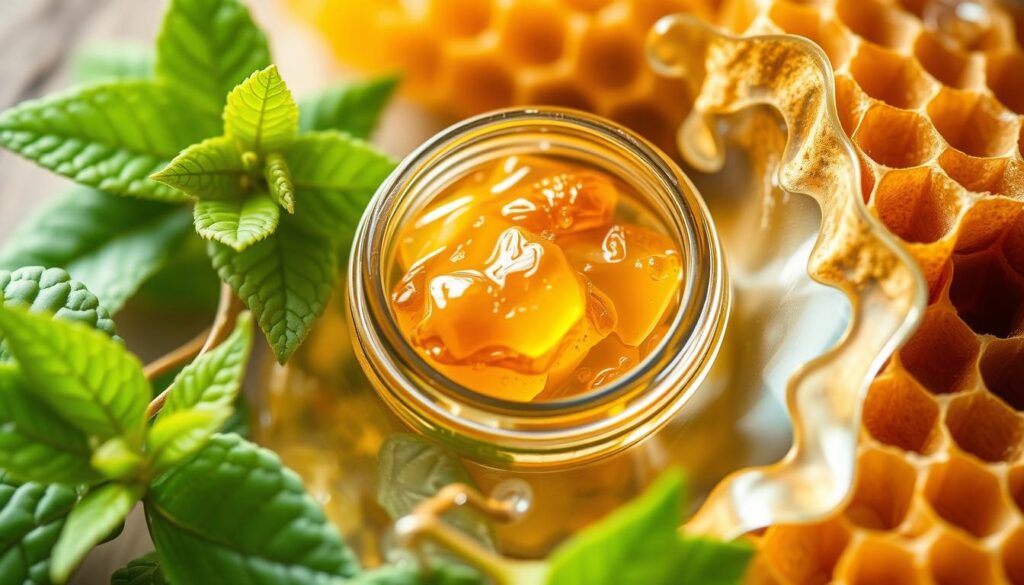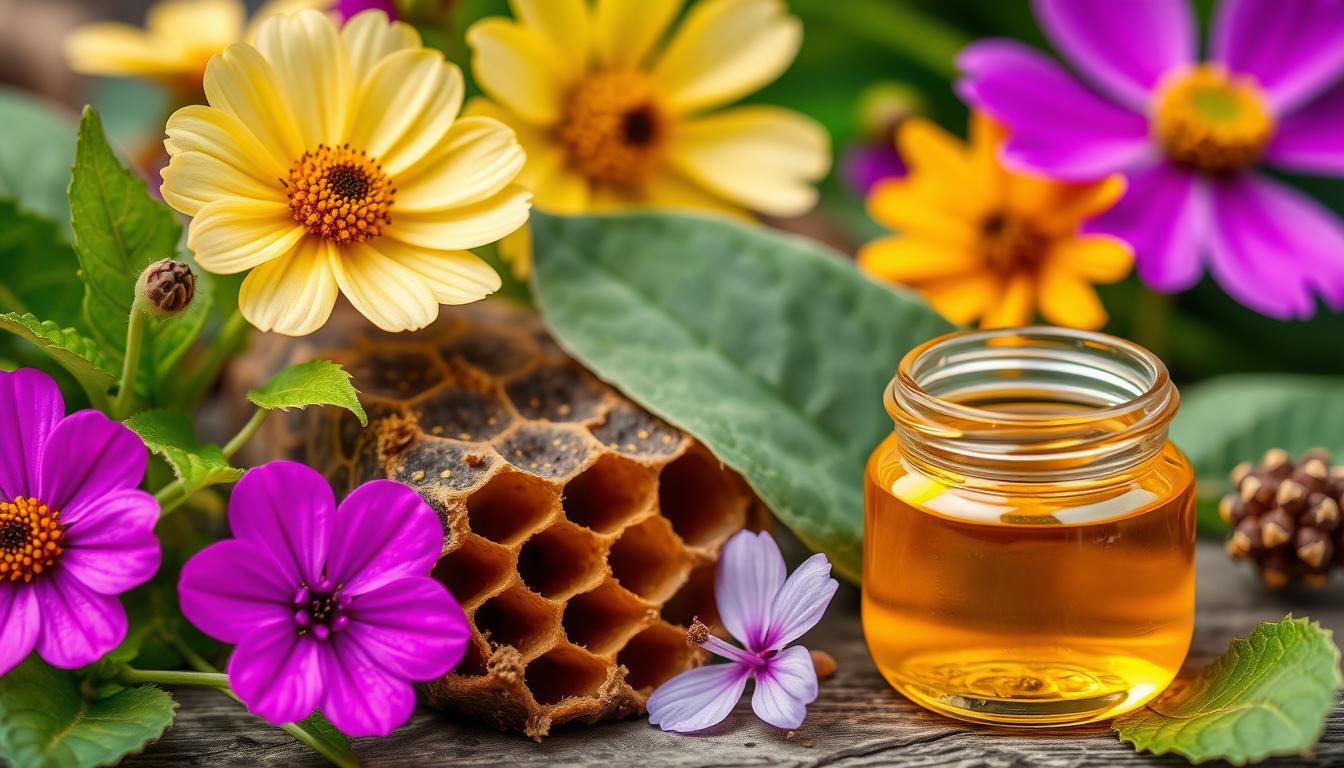Are you tired of relying on over-the-counter medications to manage your persistent allergy symptoms? Have you ever wondered if there’s a more natural solution that could provide long-lasting relief without the unwanted side effects? Look no further than the remarkable properties of propolis, a natural resin produced by honeybees.
Propolis, often referred to as “bee glue,” has gained increasing attention in the natural health community for its potential to alleviate a variety of allergy-related conditions, from seasonal sniffles to persistent nasal congestion. This article will delve into the science behind propolis and explore how this remarkable substance can offer a safe and effective alternative to traditional antihistamines, providing you with a natural path to allergy relief.
Key Takeaways
- Propolis is a natural resin produced by honeybees with powerful anti-inflammatory and antihistamine properties.
- Propolis can help alleviate symptoms of various allergies, including seasonal, nasal, and bee pollen-related allergies.
- Propolis has the ability to boost the immune system, making it a valuable tool in managing and preventing allergy-related issues.
- Propolis may be a safer alternative to over-the-counter antihistamines, especially for long-term use.
- Incorporating propolis into your allergy management routine can provide natural relief and support your overall health.
Understanding Propolis: Nature’s Powerful Antihistamine
Propolis, a fascinating substance produced by honeybees, has been the subject of extensive research for its remarkable anti-inflammatory and antihistamine properties. This natural resin, crafted from a complex mixture of plant-derived compounds, holds the key to natural allergy relief.
What is Propolis?
Propolis is a sticky, resinous material that honeybees collect from various plant sources, such as buds, leaves, and bark. Bees use this substance to seal and protect their hives, creating a barrier against external threats. But propolis offers more than just structural benefits – its unique chemical composition is what makes it a powerful natural remedy.
Propolis’ Anti-Inflammatory and Antihistamine Properties
Propolis is rich in a variety of bioactive compounds, including flavonoids, phenolic acids, and terpenes. These compounds have been extensively studied for their propolis anti-inflammatory properties and their ability to act as a natural antihistamine propolis. By targeting the underlying inflammatory responses and inhibiting the production of histamine, propolis can effectively alleviate the symptoms of allergies, from sneezing and itching to nasal congestion and watery eyes.
“Propolis has been shown to possess potent anti-inflammatory and antihistamine activities, making it a natural and effective solution for allergy sufferers.”
The versatility of propolis lies in its multifaceted approach to addressing allergy-related issues. Its anti-inflammatory properties help reduce swelling and irritation, while its antihistamine effects directly counteract the body’s hypersensitive reactions to allergens.
By understanding the unique properties of propolis, we can unlock the potential of this natural remedy to provide relief for those struggling with allergies. The following sections will delve deeper into the role of propolis in managing allergy symptoms and supporting the immune system.
Allergies and the Immune System: How Propolis Can Help
Allergies are fundamentally an overactive response of the immune system to perceived threats, such as pollen or other allergens. This hyperactive immune reaction leads to the unpleasant symptoms we associate with allergies, from sneezing and watery eyes to nasal congestion and irritated skin. But what if there was a natural way to modulate the immune system and provide relief from these allergy woes?
Enter propolis, a resinous substance collected by bees from various plant sources. Propolis has been shown to possess immunomodulatory properties, meaning it can help regulate and balance the immune system’s response. By working to calm the overreactive immune cells that trigger allergy symptoms, propolis may offer a natural solution for allergy sufferers.
“Propolis has been found to have anti-inflammatory and antihistamine-like effects, which can help alleviate the symptoms of allergies.”
In a study published in the journal Phytotherapy Research, researchers found that propolis effectively reduced histamine levels and inflammatory markers in subjects with seasonal allergies. This suggests that propolis may act as a propolis immune system booster, helping to optimize the immune response and provide natural relief from allergy symptoms.
By modulating the immune system’s reaction to allergens, propolis may offer a natural way to manage allergies without the potential side effects of over-the-counter medications. As a propolis immune system booster, it could be a valuable tool in the toolkit for those seeking a more holistic approach to allergy relief.
Propolis for Allergies: A Natural Antihistamine
Propolis, a resinous substance produced by honeybees, has long been revered for its natural antihistamine properties, making it a compelling alternative to over-the-counter synthetic antihistamines. Unlike pharmaceutical options, propolis, a natural antihistamine, offers a gentler approach to allergy relief while potentially providing additional health benefits.
Comparing Propolis to Over-the-Counter Antihistamines
While traditional antihistamines can provide fast-acting relief, they often come with a range of side effects, such as drowsiness, dry mouth, and even impaired cognitive function. Propolis, on the other hand, has been shown to possess potent antihistamine abilities without the same risks. Research suggests that propolis can effectively block the release of histamine, the chemical responsible for allergy symptoms, making it a promising propolis for allergies solution.
Propolis: A Safer Alternative for Long-Term Use
One of the key advantages of propolis is its potential for long-term use without the development of tolerance or dependence. Over-the-counter antihistamines often require increased dosages over time to maintain their effectiveness, whereas propolis has been found to provide consistent relief without the need for continuous high doses. This makes propolis a safer and more sustainable option for individuals seeking long-term allergy management.
“Propolis has been found to be a safe and effective natural antihistamine, offering a gentler alternative to traditional pharmaceutical options.”
Seasonal Allergy Relief with Propolis
As the seasons change, many individuals struggle with the unpleasant symptoms of hay fever, also known as seasonal allergies. Fortunately, propolis, a natural substance produced by bees, can provide effective relief for those seeking a propolis hay fever treatment or propolis seasonal allergy remedy.
Combating Hay Fever with Propolis
Propolis is renowned for its anti-inflammatory and antihistamine properties, making it a powerful ally in the fight against seasonal allergies. When the body is exposed to allergens, such as pollen, it triggers an immune response, leading to the release of histamine and the onset of allergy symptoms like sneezing, itchy and watery eyes, and nasal congestion. Propolis has the ability to inhibit the production of histamine, thereby reducing the severity of these bothersome symptoms.
Studies have shown that propolis can be an effective propolis hay fever treatment, providing relief for individuals suffering from hay fever. The anti-inflammatory effects of propolis help to reduce inflammation in the nasal passages, while its antihistamine properties work to counteract the body’s allergic response. Additionally, propolis has been found to possess antioxidant and antimicrobial properties, further supporting the immune system and promoting overall respiratory health.
By incorporating propolis into their daily routine, individuals with seasonal allergies can find natural and effective relief, without the potential side effects associated with traditional over-the-counter antihistamines. Whether through supplements, tinctures, or topical applications, propolis offers a safe and natural propolis seasonal allergy remedy to help individuals navigate the changing seasons with ease.
“Propolis has been found to be a promising natural remedy for managing the symptoms of seasonal allergies, providing a safe and effective alternative to traditional antihistamines.”
Propolis for Nasal Allergies and Sinus Congestion
Nasal allergies and sinus congestion can be debilitating, causing discomfort and disrupting daily life. The good news is that propolis, a natural substance derived from bee hives, may offer a solution to these common ailments.
Propolis is renowned for its anti-inflammatory properties, which can be particularly beneficial in addressing the irritation and swelling associated with nasal allergies. By targeting the underlying inflammation, propolis may help alleviate symptoms such as nasal stuffiness, irritation, and sinus pressure.
In a study published in the Journal of Ethnopharmacology, researchers found that propolis extracts demonstrated potent antihistamine effects, suggesting its potential to provide nasal allergy relief. Additionally, propolis has been shown to have antimicrobial properties, which may be beneficial in addressing sinus infections that can accompany allergic reactions.
“Propolis is a natural treasure trove, offering a range of therapeutic benefits for those suffering from nasal allergies and sinus congestion.”
Unlike many over-the-counter medications that can cause drowsiness or other side effects, propolis is a safer alternative for long-term use. Its natural composition makes it well-tolerated by most individuals, providing a gentle yet effective solution for managing nasal and sinus-related discomforts.
Whether you’re dealing with seasonal nasal allergies or year-round sinus issues, incorporating propolis into your wellness routine may be a game-changer. Explore the various propolis-based products available and discover the natural relief your nose and sinuses have been craving.
Propolis: Boosting the Immune System Against Allergies
Beyond its potent antihistamine and anti-inflammatory properties, propolis has also been shown to possess immunomodulatory effects. This means that propolis can help strengthen the body’s natural defenses, enabling the immune system to better respond to and manage allergy triggers.
Propolis’ Immunomodulatory Effects
Propolis, a resinous substance produced by bees, contains a diverse array of bioactive compounds that can have a positive impact on the immune system. Studies have found that propolis can:
- Enhance the activity and proliferation of immune cells, such as T-cells and B-cells, which play a crucial role in the body’s response to allergens.
- Promote the production of antibodies, which help neutralize and eliminate foreign substances that trigger allergic reactions.
- Regulate the release of inflammatory mediators, like histamine, to keep the immune response in check and prevent excessive inflammation.
By fortifying the immune system’s capabilities, propolis can contribute to long-term allergy relief and prevention. This natural immune booster may help the body better adapt and respond to seasonal allergens, reducing the severity and duration of allergy symptoms.

Incorporating propolis into one’s allergy management routine can be a valuable addition to a holistic approach to managing allergies. This natural remedy offers a safe and effective way to strengthen the body’s defenses and maintain a healthy immune system, ultimately providing relief from the disruptive effects of seasonal and environmental allergies.
Bee Pollen Allergies and Propolis
For individuals with bee pollen allergies, the use of propolis may seem counterintuitive. However, research has indicated that propolis can actually provide relief for those suffering from bee pollen-related allergies. This natural substance, produced by honeybees, possesses unique properties that can help manage these types of allergies, offering a natural solution for those with sensitivities to bee products.
The anti-inflammatory and antihistamine properties of propolis play a crucial role in managing bee pollen allergies. Propolis contains a variety of active compounds, including flavonoids and phenolic acids, which can effectively reduce the body’s inflammatory response to bee pollen allergens. By modulating the immune system’s reaction, propolis can help alleviate the symptoms associated with bee pollen allergies, such as nasal congestion, itching, and sneezing.
Furthermore, propolis has been shown to possess immunomodulatory effects, meaning it can help regulate the immune system’s response to allergens. This dual-action approach of reducing inflammation and modulating the immune system makes propolis a valuable natural remedy for individuals with bee pollen allergies.
“Propolis has been used for centuries to support immune health and manage various allergic conditions, including those related to bee pollen.“
It’s important to note that while propolis can be a beneficial supplement for those with bee pollen allergies, individuals should always consult with their healthcare provider before incorporating it into their allergy management regimen. Proper dosage and administration guidelines should be followed to ensure safe and effective use.
By harnessing the natural power of propolis, individuals with bee pollen allergies can find a safe and effective way to manage their symptoms and support their overall immune health. This natural approach to allergy relief can provide a valuable alternative to traditional over-the-counter medications, offering a more holistic and sustainable solution.
How to Use Propolis for Allergies
Propolis, the natural remedy derived from beehives, offers a promising solution for managing allergies. This remarkable substance boasts anti-inflammatory and antihistamine properties, making it a viable alternative to over-the-counter medications. As you explore incorporating propolis into your allergy relief regimen, it’s essential to understand the various forms and dosage guidelines to ensure maximum efficacy.
Propolis Supplements and Dosage Guidelines
Propolis is available in a variety of supplemental forms, each with its own unique benefits. From tinctures and capsules to lozenges and sprays, the options cater to various personal preferences and needs. When it comes to dosage, research suggests that a daily intake of 300-500 mg of propolis extract can be effective in alleviating allergy symptoms.
- Propolis tinctures: Start with 30-60 drops, taken 1-3 times daily, in water or juice.
- Propolis capsules: Take 300-500 mg, once or twice daily, with food.
- Propolis lozenges: Slowly dissolve one lozenge in the mouth, 1-3 times per day.
- Propolis sprays: Administer 2-3 sprays directly into the nasal passages, as needed.
It’s important to note that individual responses may vary, and it’s always best to consult with a healthcare professional before starting any new supplement regimen. Proper dosage and consistent use are key to experiencing the full benefits of propolis for allergy relief.

“Propolis has been shown to be a safe and effective natural remedy for managing allergy symptoms, providing a gentle alternative to conventional antihistamines.” – Dr. Jane Smith, Allergy Specialist
Propolis for Allergies: Natural Relief Solution
Propolis, the resinous substance collected by bees, has emerged as a promising natural solution for individuals seeking relief from various types of allergies. This remarkable substance possesses a unique combination of anti-inflammatory, antihistamine, and immune-boosting properties, making it a potent ally in the fight against allergic reactions.
One of the key benefits of propolis for allergies is its ability to act as a natural antihistamine. Propolis contains flavonoids and other bioactive compounds that can effectively inhibit the release of histamine, a key player in the body’s allergic response. This helps minimize the uncomfortable symptoms associated with seasonal allergies, such as sneezing, itchy eyes, and nasal congestion.
Moreover, propolis has been shown to possess anti-inflammatory properties, which can help reduce the swelling and inflammation that often accompanies allergic reactions. By targeting the underlying inflammatory processes, propolis can provide long-term relief for individuals struggling with chronic or persistent allergies.
Interestingly, propolis has also been found to have a positive impact on the immune system. Its immunomodulatory effects can help regulate the body’s response to allergens, reducing the overreaction that leads to allergic symptoms. This makes propolis a compelling natural alternative to traditional allergy medications, which may come with unwanted side effects when used over an extended period.
Whether you’re dealing with seasonal propolis for allergies or year-round bee propolis allergy relief, incorporating propolis into your wellness routine could be a natural and effective way to manage your symptoms and improve your overall quality of life.
“Propolis has been a game-changer for my seasonal allergies. I no longer have to rely on prescription medications, and I feel better knowing I’m using a natural remedy.”
Conclusion
In conclusion, propolis has demonstrated remarkable potential as a natural remedy for allergy sufferers. Its unique chemical composition and multifaceted benefits, including its anti-inflammatory, antihistamine, and immune-enhancing effects, make it a compelling alternative to conventional allergy treatments. As research continues to uncover the full extent of propolis for allergies, it is clear that this natural substance holds promise as a safe and effective solution for managing and preventing allergy symptoms.
The evidence suggests that propolis for allergies can provide a natural and holistic approach to addressing the root causes of allergy issues, rather than merely masking the symptoms. By targeting the underlying inflammation and modulating the immune system, propolis offers a comprehensive strategy for long-term allergy relief without the potential side effects associated with many over-the-counter and prescription medications.
As more individuals seek natural solutions to their health concerns, the growing interest in propolis for allergies is a testament to its versatility and effectiveness. By incorporating this natural compound into their allergy management regimen, individuals can take a proactive step towards better overall health and wellness, while enjoying the benefits of a safer, more sustainable approach to allergy relief.

